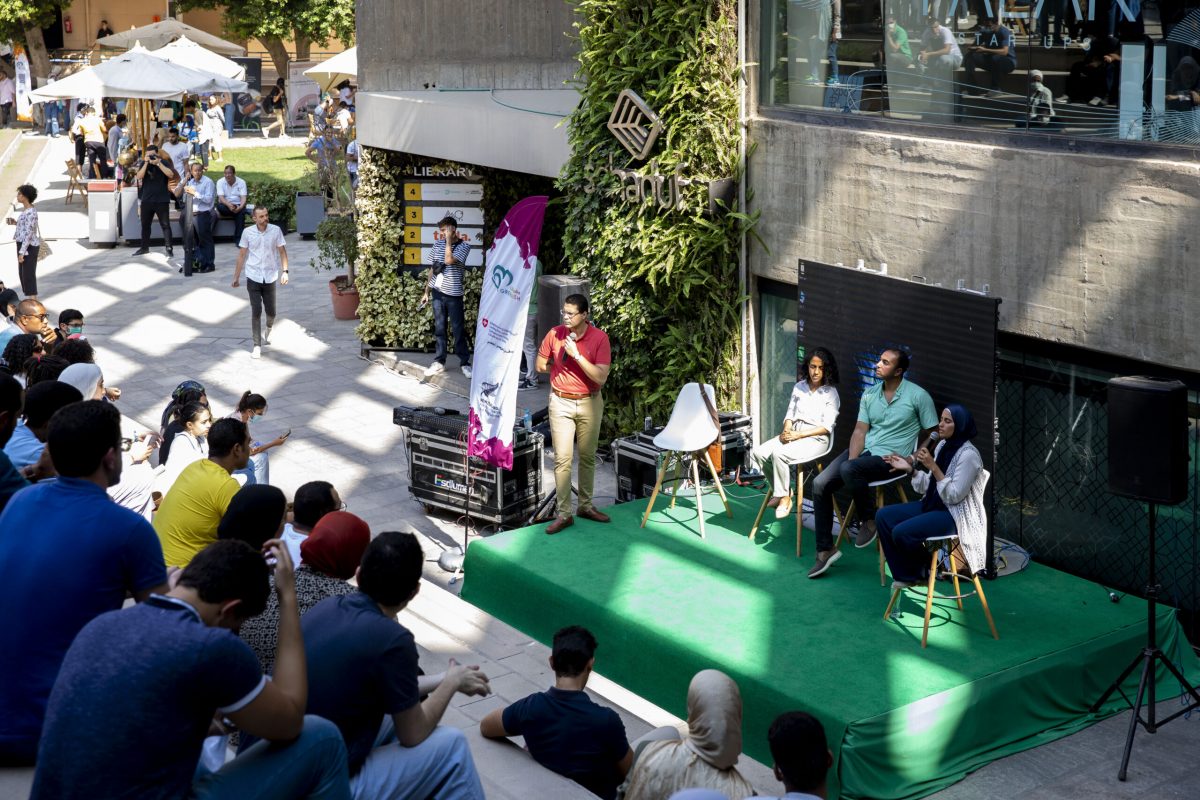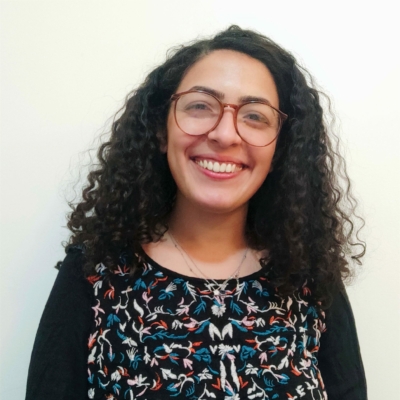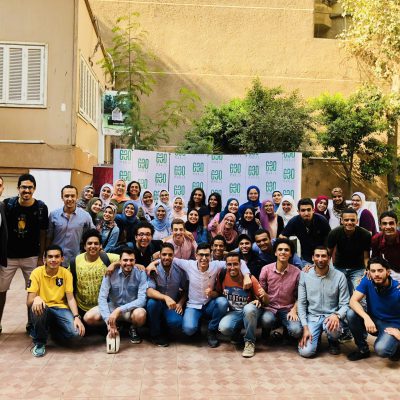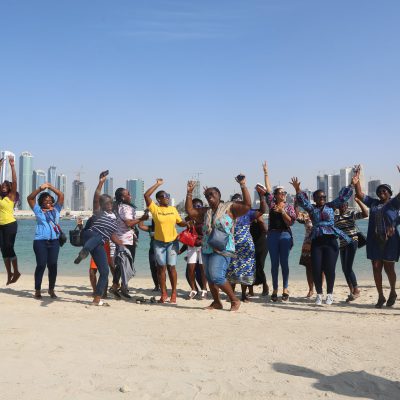
Greenish: Promoting Environmental Education and Green Businesses in Egypt
Every day, the world faces irreversible environmental damage due to manmade processes and activities. Plastic production has reached over 300 million metric tonnes each year. Eight million tonnes of them find their way to oceans, forever damaging marine life and ecosystems, not to mention other types of pollution that are generated through manufacturing, construction, transportation and more.
Shadi Khalil is a green entrepreneur who decided to break the cycle of pollution and create collective, sustainable change. With his Egyptian social enterprise Greenish, he aims to realize environmental sustainability by raising awareness through educational activities, environmental assessment services, and social initiatives.
Shadi is one of the entrepreneurs who participated in our Empowering Entrepreneurship Initiative in 2020/2021, and throughout the program, we had the opportunity to sit and chat about what it is that motivates him, and his outlook for green entrepreneurship in Egypt and across the region.
What is Greenish and how did it all start?
Greenish is a social enterprise focused on environmental education and awareness. What we do is that we provide workshops focused on environmental awareness, building the capacity of organizations, corporates, and governmental entities to become more sustainable. We also have environmental protection communities in 10 governorates around Egypt and 26 entities with 1,100 students along with our one-year program – where we support the students with environmental awareness programs on biodiversity, clean energy, waste management, food, and water. We also provide them with business training in order to start their own environmental solutions in their communities.
It was the year 2017 when Medhad Benzoher, my co-founder, and I decided to hold environmental workshops through a tour around Egypt. We thought no one would be interested in the environment at the start. We thought people perceive the environment as a lesser priority challenge next to healthcare, economic empowerment, etc. But when we launched our tour, we found them interested; they are living the environmental challenges themselves; they are going through disease and losing their jobs because of issues related to the environment. So we decided to start Greenish, and this was the beginning of our initiative.
How did COVID-19 affect your activities? Were you able to adapt?
We rely primarily on delivering workshops and volunteering events physically. So, when COVID-19 happened, it was highly challenging. For the first couple of months, most of our work stopped as most of our revenue stream was focused on sponsorships, which was also the first budget line to be cut for all the corporates we are dealing with. But then we came up with the idea of Greenish Clubs, where we can grow and disseminate our mission through the work of students across the nation.
I would say the pandemic inspired us to change the way we do things. I managed to motivate the team, but also the team managed to motivate me. I wouldn’t have survived this crisis without them, and I think it goes the other way around.
The pandemic made us think differently: How can we scale up remotely? How can we train others? And how to empower people to take what we do and deliver it within their communities. But the most crucial aspect is that we, as a team, went through the crisis because we had a shared understanding that we are building something together. It was not me managing the people, but each of us was part of a collective think-tank, looking into how to make a further positive impact while dealing with the pandemic.
Also, the COVID-19 Relief Program and the Empowering Entrepreneurship Initiative came at the right moment. Its financial support enabled us to hold on to our staff, secure their salaries, and continue our mission. Aside from that, the access to a pool of international mentors was beneficial. We were able to work with a mentor from South Africa. And this was our first encounter working with someone in the South African entrepreneurship ecosystem. It gave us room to exchange insights from both Egypt and South Africa, and it made us think of starting more collaborations in Africa. Also, the training sessions, especially those about resilience, taught me how I could take care of myself so I can keep on fighting and doing the work.
How do you define Green entrepreneurship, and how do you see its possibilities in the entrepreneurial scene in Egypt?
The way we define green entrepreneurship is mainly focused on being able to identify an environmental problem and innovate to solve it. Looking into sustainability in this equation, it is not only environmental sustainability but also social sustainability. Whether by adopting international solutions or innovating sustainable local ones to solve pressing problems like agricultural wastes, energy emissions, wastewater challenges, etc. — we call this green entrepreneurship.
But what I see is that the field of green entrepreneurship in Egypt still needs a long way to mature. It needs to be focusing on benefits to the people and on utilizing resources in the best possible way to solve existing problems, not create needs. So I think we are at a point that we need to ask ourselves a serious question: How can we solve environmental challenges considering the resources, the environment, and also the people?
Hence, when we work with the students, we try as much as possible to build their environmental capacity but also their ability to identify challenges, precisely environmental challenges within their communities. We also help them identify solutions and empower them with the knowledge that they can pass across their communities to solve existing environmental issues.
What advice would you give to a person who’s starting an initiative or a business at this time?
What I would say is to make sure that you know your reason — your ‘why.’ And that it’s clear to you. Because you’re going to wake up at specific points, certain days, questioning whether you should continue doing what you are doing or not, these are going to be hard days. The way is full of butterflies, celebrations, and people telling you that you are great – but it will also be full of hardships and times where you need to be your own and only motivation.
That’s why you need to be in contact with your reason — Is it because of money? That can be a reason, and you need to be hundred percent sure of it. Is it because you want to create a specific impact? Are you able to visualize this impact? Write this on paper or draw it, whatever you want to do but make sure that you connect to this every day – because on hard days if you don’t have a reason or are not honestly aligned with it, it won’t be possible to push through.
What are the latest updates from Greenish that you would like to share?
Besides moving forward with Greenish Clubs and setting new plans, last September, we held our first festival; the Greenish Environmental Festival (Pictured in the header). We brought art together with innovators, makers, and environmental entrepreneurs — all in one location. It took place at the Greek Campus of the American University in Cairo (Tahrir) and hosted various panel discussions and music performances. The participants also had the chance to join workshops on different fields, including Sustainability and Art, Upcycling, Biomimicry, Waste Management, Origami, Storytelling, Carpentry, Agriculture, and Compost Manufacturing.
In the meantime, we’re participating in the 26th UN Climate Change Conference of the Parties (COP26) in Glasgow, which aims to accelerate action towards the goals of the Paris Agreement and the UN Framework Convention on Climate Change by bringing civil societies together with companies and people. I’ll be there representing Greenish as well as interviewing decision-makers, influencers, researchers and policymakers throughout the conference.
So, follow our social media accounts to watch a live coverage and get involved!




